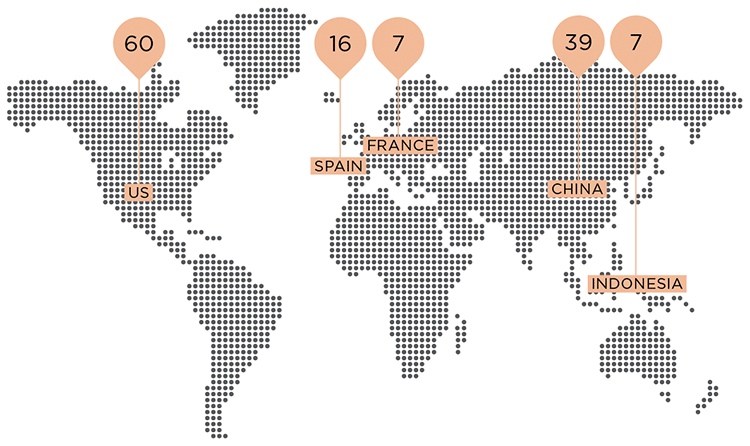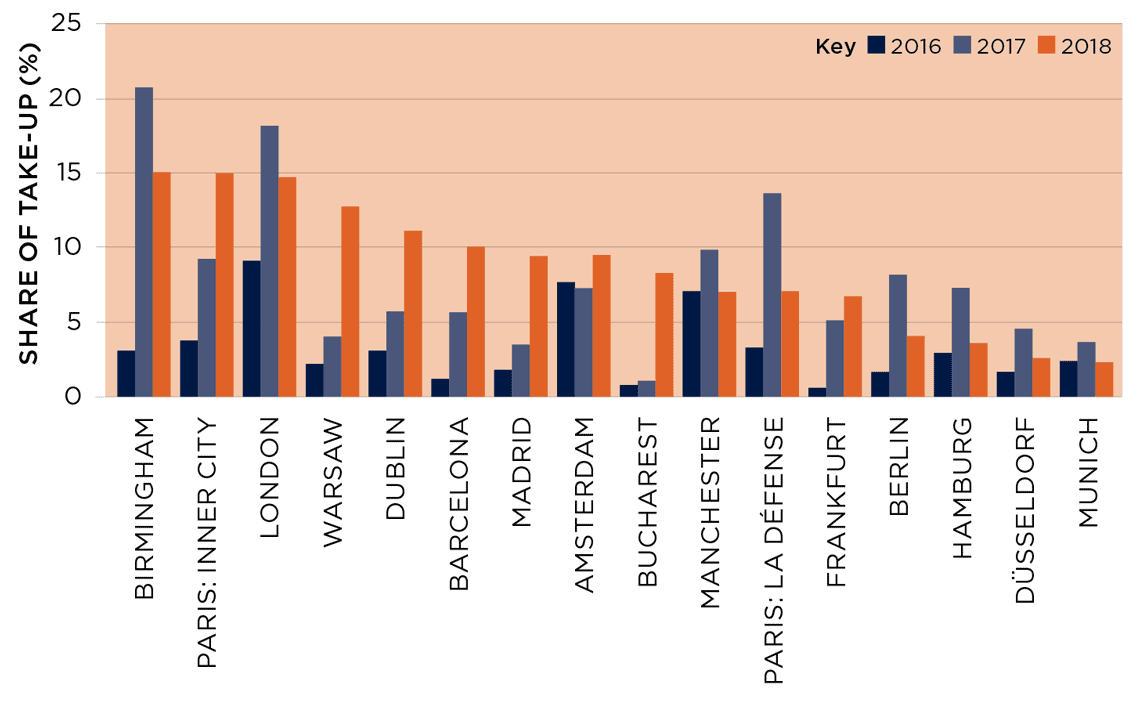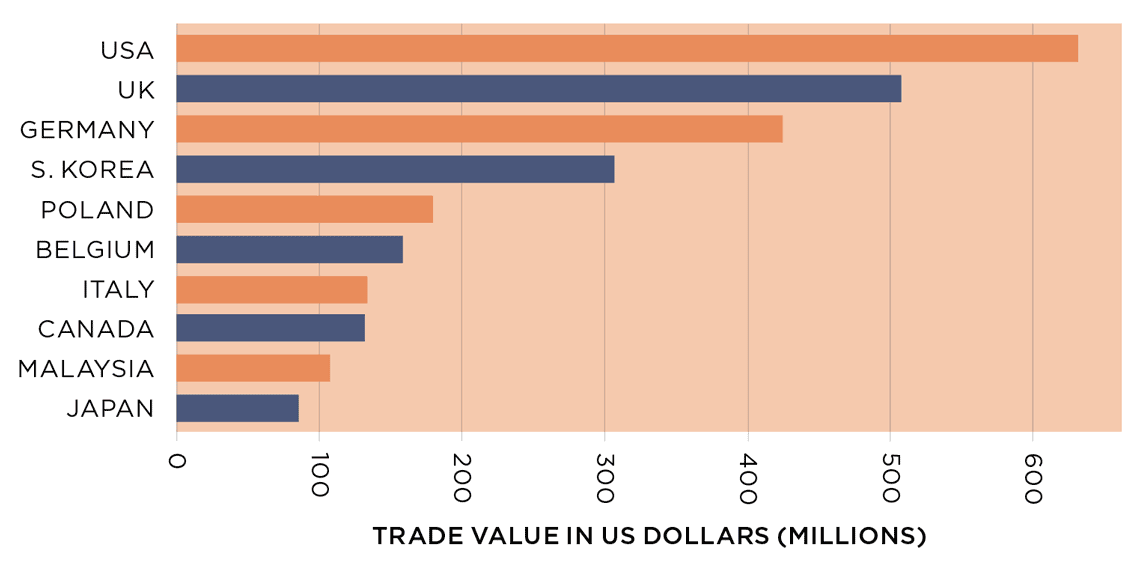Young people love to collaborate. For them, connecting with other people, either through planned meetings or serendipitous interactions, is valuable professionally. It helps enrich their communities.
Co-working was the first place we saw this trend, as young companies deliberately chose open-plan offices with other businesses and freelancers to share and innovate together. Now, this format is transforming the office sector. Full-time workers also want to feel the co-working spirit in their offices, and employers are seeing the benefit of fostering this culture.
Co-working was responsible for 9.9% of office take-up in Europe in 2018, led by the global brand WeWork, which took one-third of the space. Stockholm and Brussels had the highest rates of take-up at almost 25% and 22% respectively, followed by Birmingham, London and Paris at about 15%. Now, traditional landlords, such as British Land and The Crown Estate in the UK, and Tishman Speyer in the US, have launched their own co-working brands.
The concept has also extended to homes. Co-living is becoming a housing option of choice for millennials in large cities, as they can live in a community and socialise and exchange ideas with like-minded people. Brands in this space include The Collective in the UK, Common, WeLive and Roam in the US, and You+ and Harbour in China. The format is competing with traditional residential markets, which struggle to keep pace with growing urban populations and their evolving needs.
A desirable housing option for millennials. The most co-living spaces – top five countries

Source: getkin.io
Space as a service
Flexibility is another core value for millennials. In response to the financial crisis and the emergence of more sophisticated mobile technology, the gig economy has cemented employment where professionals make money by sharing their skills and talents directly with consumers. Sometimes, this is their main income, while for others it’s a ‘side hustle’. But in all cases, these professionals want their workplace to suit this flexibility.
This is a trend that corporate occupiers now want to be part of. They are taking space in co-working environments, particularly with teams that grow and shrink in response to market forces. This flexibility is good for the economy. It not only allows businesses to expand and contract more easily, but also compels traditional landlords to work harder to keep tenants and become operators of ‘space as a service’. This is likely to start a trend towards traditional lease terms on conventional office space being shortened. Landlords will also increasingly join forces with specialist operators to help them maximise the potential of their assets through branding, marketing and active management.
Flexible office take up. The collaborative, innovative co-working spirit is driving demand across Europe

Source: Savills Research
A move towards shorter lease terms will also change the role offices play in an investment portfolio – income is less secure, but the risks can be reduced through better active management. Office property cash flows will require an operational approach, similar to the practices we see in the hospitality sector. In the US, we already see examples of landlords entering into management agreements with flexible office space operators to minimise voids and maximise their buildings’ potential through shorter lease agreements.
Experience versus material goods
Younger generations seek experience rather than material goods. This is partly due to necessity: in difficult economic times they want to get the most enjoyment out of what they have. The spirit of this value is reflected in Airbnb. The effects are already being felt in the hotel industry, which is taking Airbnb seriously as a competitor. Consumers choosing a hotel instead of Airbnb are now seeking a more personal experience, and the industry is starting to respond by offering more boutique hotels in niche locations, and a focus on individual experience whether through architecture, the design of common areas or cuisine, such as The Student Hotel.
With large purchases, such as cars and houses, increasingly out of reach of young people, they are craving ownership less. For them, to borrow or share is a more efficient and environmentally friendly option. Again, Airbnb is a good example. Some are treating the service as quasi-residential, renting in different cities for three or six months. Co-living/co-working concepts targeting mobile professionals, such as Outsite and Nomad House, are also responding to the needs of ‘digital nomads’: young, adaptable people who avoid traditional leasing and ownership arrangements.
Car-sharing is also a mainstay for the younger generation, many of whom believe they will never need to own a vehicle. Instead, they rely on cheap and readily available services such as Uber, Lyft in the US, Zipcar in the UK and GoGet in Australia. This is influencing residential values by providing access to locations that aren’t well-served by public transport. Suddenly, the benchmark of the affordable late-night cab home has opened up new locations. As we move towards self-driving cars, this will also reduce car ownership and the need for parking spaces. Some car parks and garages may become redundant and emerge as possible future redevelopment opportunities for uses such as residential, or last-mile delivery centres.
Changing behaviour
With a less predictable life path than their parents’ generation and so much new technology, younger people are more adaptable, and more open to alter their behaviour to satisfy other values, such as ethical consumption. For example, they see how much clothing people buy and then dispose of quickly. These generations are likely to support a more evolved sector of second-hand goods. We already see this in major cities globally where there are a growing number of shops with well-selected second-hand items.
Material Gains. The value of the second-hand clothes market
 Source: UN Comtrade via Statista
Source: UN Comtrade via Statista
Another response to changing consumer ethics and preferences is co-retailing, where business hosts offer designers, local producers and start-up retailers the chance to share space, often on flexible lease terms. This gives them the freedom and flexibility to experiment and engage with the community in order to try their products. Bulletin in the US supports female-led, online-only brands, while in France, Grand Frais is a food specialist managed by self-employed artisans. The produce is primarily locally sourced and in limited amounts, which helps keep stock costs down.
Work-life balance
This millennial generation has it right when it comes to work-life balance. By making the most of technology, people are freer to work and live how and where they want. Real estate cannot fall behind in this shift in attitude. From co-working and co-living to providing personalised experiences, the heart of this change for the real estate industry will be about service.
Hybrid concepts are emerging, combining workspace with retail, student housing with hospitality, living with working. Real estate owners will be expected to offer service and experience. They will need to be closer to their consumers, working harder to remain attractive to tenants and residents, and providing easy, flexible and social environments for people to live, work and play. Only then will it have the attention of the younger generation.
The value of sharing space
A sense of sharing is also permeating regular multi-tenant offices, with corporates now less guarded about issues of confidentiality that have kept companies rigidly apart. “The place called ‘work’ is happening all around us,” says Katrina Kostic Samen, Founder and Managing Partner of KKS, and current President of the British Council for Offices. “Employees have to use their judgement on confidentiality issues but corporates are now more understanding about sharing space.”
This could be shared social or meeting spaces, or, in the instance of KKS, letting out co-working desks to two complementary companies. “It allowed me to build in flexibility and bring diversity into my design world with revenue-supporting expansion,” says Kostic Samen.
For landlords, it allows for a creative way to use space that might not be leased traditionally – either by providing shared space or co-working options. However, there is still some way to go before landlords are doing this more willingly. “For the landlord to give up space for the betterment of the totality, the sticking point is the investment value,” says Kostic Samen, with valuers still focused on ring-fenced 25-year leases. “The whole world of valuation has to change to pick up these pieces.”
Make it personal: how to market to millennials
Connecting with the younger generation is a challenge that all businesses face, even ones such as Unilever, whose products are used by 2.5 billion people a day. “We have hyper-empowered consumers with a remote control to the world – a smartphone – that enables them to search for free, post for free, watch videos for free and connect with brands, whether that is Savills or Hellmann’s Mayonnaise,” says Keith Weed, Chief Marketing Officer at Unilever.
For Unilever, this means getting closer to individual consumers. “We used to have a very broadcast approach to marketing, and it is now actually narrowcast,” Weed says. “We have more access to first-party data so we can engage directly with individuals on content and advertising and sales.” One example is Unilever’s successful company Dollar Shave Club, which is a direct-to-consumer razor business.
Weed says brevity and accessibility are the way to catch consumers’ attention. “People are engaging with content in a casual manner in all sorts of different places. They could be looking at content on the bus or train, or while waiting for a cab,” he says.
Consumers are also backing products that they see as purpose-driven, such as Dove, with its body-positive attitude, or Ben & Jerry’s, with its focus on social justice in business. “These purpose-led brands are growing 46% faster and delivered 70% of our growth,” says Weed, with a growing number moving out of the niche or premium space and becoming mainstream.




